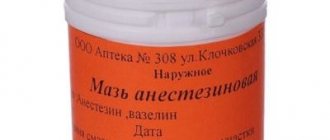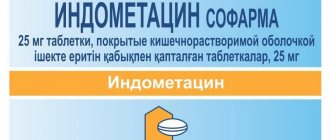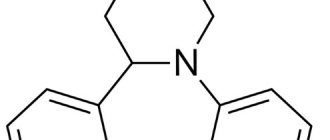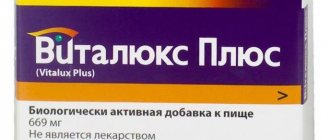The medical preparation “Magnesium Plus” in effervescent tablets is a pharmacological agent that helps replenish the lack of magnesium in the body.
This medication is produced in the form of effervescent tablets: white, with a slightly greenish or yellow tint, with a beveled edge, flat-cylindrical, round, with a slight specific odor; on one side there is a dividing strip (12 or 10 pcs. in plastic cases, in an envelope pack of 1 pencil case with a device for hanging; 2, 4, 6, 8, 10, 12 pcs. in blisters or strips, 1 -5, 10 or 15 in a cardboard box).
The effervescent tablet "Magnesium Plus" contains the following active ingredients:
- magnesium (as lactate);
- magnesium (in the form of carbonate);
- folic acid – 0.2 mg;
- vitamins B6, B12.
The following are used as excipients in the production of this medication: sodium bicarbonate, sodium saccharinate, macrogol, citric acid, sorbitol, flavoring.
Release form and composition
The drug is available in the form of effervescent tablets: white or white with a slightly greenish-yellow tint, flat-cylindrical, with a beveled edge, round, with a specific faint odor; on one side - a dividing strip (10 or 12 pcs. in plastic cases, 1 pencil case in an envelope pack with a device for hanging or a cardboard pack; 2, 4, 6, 8, 10, 12 pcs. in strips or blisters , 1-5, 10 or 15 strips or blisters in a cardboard box).
The composition of 1 effervescent Magnesium Plus tablet includes the following active ingredients:
- Magnesium (in the form of carbonate) –100 mg;
- Magnesium (in the form of lactate) – 200 mg;
- Folic acid – 0.2 mg;
- Vitamin B6 – 2 mg (as pyridoxine);
- Vitamin B12 – 0.001 mg (as cyanocobalamin).
Auxiliary components: sodium bicarbonate (sodium bicarbonate), sodium saccharinate, citric acid, macrogol (polyethylene glycol), sorbitol, flavoring additive.
Contraindications to the use of the medication
The drug "Magnesium Plus" in effervescent tablets is not prescribed to patients with severe renal failure (creatinine clearance - below 30 ml per minute), under the age of 6 years, with hypersensitivity to the components of the composition.
Due to the high likelihood of developing hypermagnesemia in moderate functional renal failure, the medication is prescribed with caution. It is not recommended to take it during lactation. During pregnancy, you can use the drug only as prescribed by a specialist.
Pharmacodynamics and pharmacokinetics
Magnesium is a vital element involved in the regulation of the nervous system. It plays an important role in the normalization of ionic balance and the transmission of nerve impulses, ensures full muscle contraction and is an important component of metabolic reactions and energy processes (ATP, considered a chemical source of energy, is able to participate in the process of energy synthesis only in the form of magnesium salt).
Vitamin B6 is involved in metabolism, directly affects erythropoiesis, provides support for the structure and function of gums, teeth, bones, normalizes the functioning of the nervous system and complements the action of magnesium.
Folic acid and vitamin B12 take part in many enzymatic reactions and have a beneficial effect on the nervous system and hematopoietic system.
Magnesium is absorbed in the gastrointestinal tract by no more than 50% of the dose taken. In the body, 99% of this element is distributed inside cells. Approximately 2/3 of intracellular magnesium occurs in bone tissue, and the remaining amount passes into striated and smooth muscle tissue. The element is excreted in the urine in an amount of 1/3 of the dose of the drug taken. Glomerular filtration is 70% of plasma filtration, and tubular reabsorption reaches 95–97%.
Pyridoxine hydrochloride is absorbed at high speed throughout the small intestine, mostly being absorbed in the jejunum. The substance is metabolized in the liver, forming pharmacologically active metabolites (pyridoxaminophosphate and pyridoxal phosphate). Pyridoxal phosphate is 90% bound to plasma proteins. Pyridoxine hydrochloride penetrates well into all tissues, accumulating mainly in the liver, and to a lesser extent in the central nervous system and muscle tissue. The compound passes through the placental barrier and is excreted in breast milk. The half-life is 15–20 days. Pyridoxine hydrochloride is excreted primarily through the kidneys (when administered intravenously with bile, 2% of the substance is released), as well as during the hemodialysis procedure. Approximately 8–10% of the compound is excreted unchanged in the urine.
Most folic acid is well absorbed in the gastrointestinal tract, mainly in the upper parts of the duodenum. The compound binds intensively to plasma proteins and penetrates into breast milk, as well as through the placental and blood-brain barriers. The maximum concentration of folic acid is achieved 60 minutes after taking Magnesium Plus. The substance accumulates and is metabolized in the liver, forming tetrahydrofolic acid (with the participation of dihydrofolate reductase in the presence of ascorbic acid). Folic acid is excreted through the kidneys, mainly in the form of metabolites.
Cyanocobalamin is absorbed mostly in the small and partially in the large intestine. In the blood, the substance combines with transcobalamins I and II, with which it is transported to tissues. Cyanocobalamin accumulates mainly in the liver, from where it enters the intestines with bile and is reabsorbed into the body. Excretion of the compound occurs through the kidneys. It also penetrates the placental barrier and into breast milk. After oral administration of Magnesium Plus in a dose of up to 2 mg, cyanocobalamin is absorbed by 30–97%. When taken in doses greater than 2 mg, the absorption of this compound is markedly reduced. Cyanocobalamin is 90% bound to plasma proteins, and its maximum concentration after oral administration is reached within 6–14 hours. The half-life from the liver is 500 days. With normal renal function, the substance is excreted: 7–10% through the kidneys, approximately 50% through feces. In case of kidney dysfunction, cyanocobalamin is excreted: 0–7% through the kidneys, 70–100% in feces.
Magnesium benefits for women: how much you need and what a lack of magnesium leads to
Any woman wants to be healthy, young, beautiful and energetic. Magnesium: its benefits for women are priceless or is the importance of this substance exaggerated? Let's look into this issue together.
A list of what a lack of magnesium can lead to in a woman’s body and several typical mistakes that the fairer sex makes:
- devoting a lot of time to various cosmetic procedures, some girls and women do not think at all that the good condition of teeth, nails and hair largely depends on a sufficient amount of magnesium in the body; you need to understand that without magnesium, calcium cannot be absorbed, and therefore it is quite difficult to achieve good results in restoring the balance;
- Magnesium deficiency in women leads to disruption of the metabolism of the extracellular environment, accelerated aging, and a significant slowdown in the synthesis of elastin and collagen fibers. The appearance of wrinkles and slow skin regeneration worries women, but, as a rule, they look for solutions to these problems in other areas, sometimes resorting to radical measures;
- Such unpleasant phenomena for women as swelling, pain during menstruation, engorgement of the mammary glands and psycho-emotional stress of the so-called premenstrual syndrome (PMS) can also signal a lack of magnesium. But instead, patients often take painkillers;
- It is not for nothing that magnesium is included in the complex therapy of a number of diseases of the genital organs, since a deficiency of this element leads to an imbalance of cytokines. These are small peptide molecules that regulate hormonal processes, stimulate the body's immune response to irritants and limit the development of inflammation. However, some women, self-medicating, begin to take hormones, antibiotics and other drugs, which worsens the situation;
- ebbs and flows, profuse sweating, a feeling of heaviness in the head, as well as muscle pain and discomfort in the joints, dizziness, loss of sensation in the hands and feet... All this indicates that the body needs magnesium subsidies (replenishment of this element) in a difficult period of life for many women, but most patients do not take any measures to make it easier to enter menopause;
- blood magnesium levels in women with diabetes are negative compared to lipids and fat mass; This means that excess weight may also indicate a lack of magnesium. Instead of consulting a doctor and adjusting their diet, women are looking for a magic pill that will help them quickly lose extra pounds;
- a lack of magnesium in the body of a mature woman directly affects her ability to safely bear and give birth to a healthy child. Due to magnesium deficiency, there is a risk of long-term threat of miscarriage, placental calcification, impaired embryo implantation, and premature birth. In addition, weakness of labor and problems with cervical dilatation may be observed. Quite often, pregnant women, due to magnesium deficiency, experience tremors, cramps in the calf muscles, increased uterine tone, and high blood pressure. You cannot neglect the recommendations of a gynecologist, who, as a rule, always prescribes a course of magnesium during pregnancy.
Daily dose of magnesium for women
The recommended daily dose of magnesium for women is 320 mg, for pregnant women - 360 mg, and for breastfeeding women - 390 mg.
It should be noted that for medicinal purposes, a doctor can prescribe an individual daily dose of magnesium to a woman, based on the physiological characteristics of her body and the presence of chronic diseases.
special instructions
It must be taken into account that high mental and physical stress, as well as frequent consumption of alcoholic beverages and laxatives, increase the need for magnesium.
In case of calcium-magnesium deficiency, the lack of magnesium must be eliminated before calcium replenishment begins.
Impact on the ability to drive vehicles and complex mechanisms
The drug does not affect the ability to drive vehicles or operate potentially dangerous machinery.
Indications for use
According to the information from the instructions for use, the medical drug “Magnesium Plus” in effervescent tablets is prescribed for magnesium deficiency and pathological conditions associated with it.
These conditions are:
- feeling of constant fatigue;
- difficulty in perceiving information, excessive absent-mindedness;
- spasms of muscles and blood vessels, tingling in the arms and legs;
- frequent dizziness, causeless loss of balance;
- excessive hair loss, weak nails, development of caries;
- sleep disorders - insomnia, nightmares;
- nervous eyelid tic;
- blurred vision, flickering spots in the eyes;
- stomach cramps, diarrhea;
- depressive states;
- weather sensitivity.
Analogues of the drug
The list of the most well-known analogues of this pharmacological drug includes the following:
- "Superjacks";
- "Vitrum";
- "Baby formula";
- "Vitrum prenatal";
- "Vitrum teenager";
- "Kaltsinova";
- "Multi-tabs classic";
- "Complivit-active";
- "Asparkam";
- "Multi-tabs junior";
- "Univit AZ formula";
- "Pikovit D";
- "Selmevit";
- "Duovit";
- "Elevit Pronatal";
- "Triovit."
A doctor should select a replacement.
Drug interactions
Calcium preparations (in the form of phosphates and salts) help reduce the absorption of magnesium. With the simultaneous use of levodopa and vitamin B6, a significant inhibition of the activity of levodopa is observed. Pharmacological preparations containing magnesium may reduce the absorption of tetracycline (a break of 3 hours between the use of such drugs is recommended).
Overdose symptoms
According to the instructions for use for effervescent tablets "Magnesium Plus", signs of a drug overdose are: anuria, cardiac arrest and paralysis, low blood pressure, slow reflexes, depression of the respiratory center, vomiting, nausea. In such cases, forced diuresis and rehydration are performed. For renal failure, hemodialysis or peritoneal dialysis is recommended.
Reviews of effervescent tablets "Magnesium Plus"
Today, many people suffer from a lack of vitamins and many minerals in the body, which are necessary to maintain normal life. To compensate for the deficiency of magnesium, the medicine “Magnesium Plus” is often used in the form of effervescent tablets. According to reviews, this medicine is of fairly high quality, moderately expensive and quite effective. Patients note that this medicine helps with frequent occurrence of cramps in the limbs, nervous disorders, periodic pain, insomnia, and excessive fatigue. The positive effect, as consumers note, is not observed immediately, but after some time of treatment with the medication - about 1 week. Adverse reactions occurred rarely in patients; the most common among them was allergies. This manifested itself in the form of skin rashes and itching.
As for the taste of effervescent tablets "Magnesium Plus B6", the opinions of patients were divided. Some believe that the medicine tastes good, is easy to take, and does not cause nausea. Other patients prefer to take drugs in the form of insoluble, odorless and tasteless tablets.
Similar drugs:
- Carsil Dragee
- Ascorutin Oral tablets
- Yogurt Capsule
- Ergoferon () Lozenges
- Magne B6 Oral tablets
- Omez Capsule
- Papaverine Oral tablets
** The Drug Directory is intended for informational purposes only. For more complete information, please refer to the manufacturer's instructions. Do not self-medicate; Before you start using Magnesium Plus, you should consult a doctor. EUROLAB is not responsible for the consequences caused by the use of information posted on the portal. Any information on the site does not replace medical advice and cannot serve as a guarantee of the positive effect of the drug.
Are you interested in Magnesium Plus? Do you want to know more detailed information or do you need a doctor's examination? Or do you need an inspection? You can make an appointment with a doctor - the Euro lab is always at your service! The best doctors will examine you, advise you, provide the necessary assistance and make a diagnosis. You can also call a doctor at home . Euro lab clinic is open for you around the clock.
** Attention! The information presented in this medication guide is intended for medical professionals and should not be used as a basis for self-medication. The description of the drug Magnesium Plus is provided for informational purposes only and is not intended for prescribing treatment without the participation of a doctor. Patients need to consult a specialist!
If you are interested in any other drugs and medications, their descriptions and instructions for use, information about the composition and form of release, indications for use and side effects, methods of use, prices and reviews of drugs, or you have any other questions and suggestions - write to us, we will definitely try to help you.









